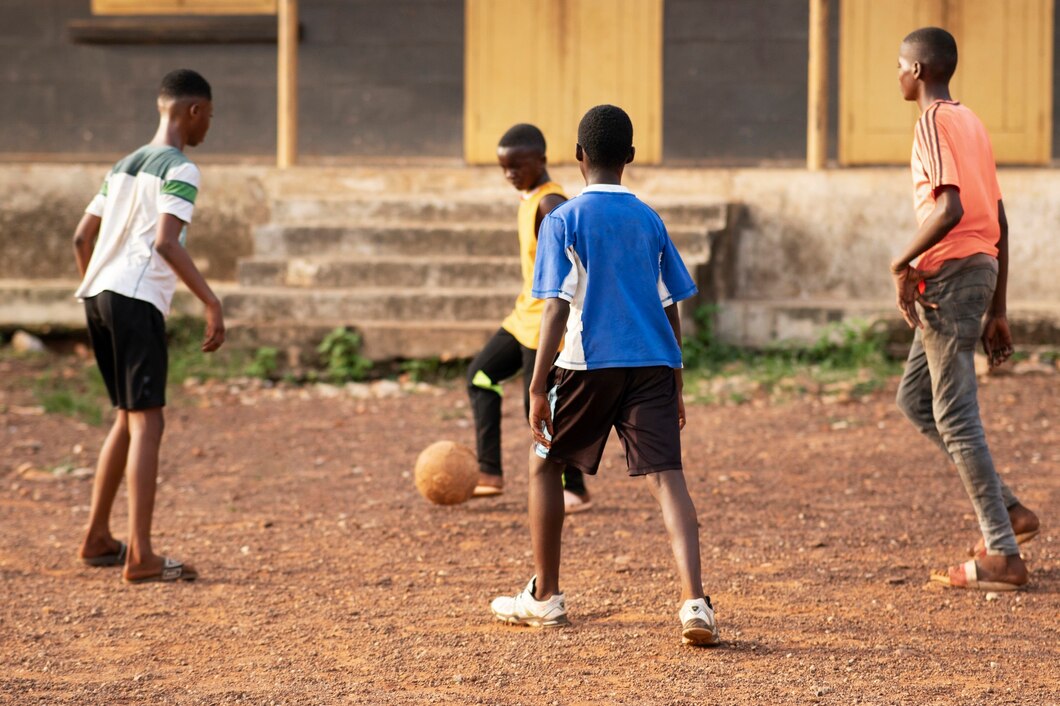Sports Participation Improves Academic Performance, Study Suggests
By Adebowale Bello. B.Tech Microbiology, Freelance Health Writer. Medical reviewed by the DLHA Team

African kids playing footbal outdoors. Image credit: Freepik
Physical activity is often seen as a way to keep children healthy but its benefits go beyond fitness. A recent Canadian study has found a strong connection between childhood physical activity and later academic success. While this research was conducted in a Western setting, the findings hold valuable lessons for African parents, educators and policymakers. Encouraging children to be physically active could be a key way to improve their educational outcomes.
The study consisted of 2775 children aged between 12 and 20 and this data was derived from the National Longitudinal Study on Children and Youth (NLSCY). They reported their participation in structured or unstructured sports and also reported their academic progress as the years went by.
What the Study Found
According to the study:
However, not all physical activities had the same impact.
This suggests that the type of physical activity matters, with structured activities providing greater benefits in developing discipline, teamwork and cognitive skills that support learning.
Experts suggest several reasons why structured physical activity can boost academic performance:
1. Improved Cognitive Function: Regular exercise enhances brain function by increasing blood flow and oxygen supply, which helps with concentration, memory and problem-solving skills.
2. Discipline and Time Management: Organised sports teach children how to manage their time effectively, balancing schoolwork and extracurricular activities.
3. Social and Emotional Benefits: Participation in sports and other structured activities helps children develop social skills, resilience and teamwork—traits that are valuable for academic success.
4. Mental Health Benefits: Physical activity reduces stress and anxiety, both of which can negatively affect school performance.
Despite these benefits, many African children do not get enough physical activity outside of school hours. Several factors contribute to this:
To ensure African children benefit from physical activity, parents, schools and policymakers can take the following steps:
1. Integrate Sports into School Curriculum: Schools should make physical education a priority, ensuring that structured sports activities are part of the curriculum.
2. Create Affordable Community Sports Programmes: Local governments and private organisations can work together to provide affordable or free sports programmes for children.
3. Encourage Parental Support: Parents should see physical activity as an investment in their child’s future and encourage participation in structured sports.
4. Promote Gender Inclusivity: Families and schools should actively support girls in sports, ensuring they get the same opportunities as boys to engage in structured physical activities.
5. Leverage Existing Resources: Schools and communities can use open fields, school compounds and even church grounds for structured physical activities.
The findings of this study confirm that childhood physical activity, particularly structured sports, has long-term benefits for academic achievement. For African children to reach their full academic potential, parents and educators must recognise the role of sports and structured play in shaping future success.
By breaking down barriers to participation and creating more opportunities for physical activity, we can help ensure that children not only stay healthy but also perform better in school and beyond.
Source: Kosak, L.-A, Harandian, K, Bacon, S. L, Fitzpatrick, C, Correale, L, & Pagani, L. S. Active Child, Accomplished Youth: Middle Childhood Active Leisure Fuels Academic Success by Emerging Adulthood. Children, 2024;11(9), 1140. Available from here
Related:
Published: February 18, 2025
© 2024. Datelinehealth Africa Inc. All rights reserved.
Permission is given to copy, use and share content for non-commercial purposes without alteration or modification and subject to source attribution.
DATELINEHEALTH AFRICA INC., is a digital publisher for informational and educational purposes and does not offer personal medical care and advice. If you have a medical problem needing routine or emergency attention, call your doctor or local emergency services immediately, or visit the nearest emergency room or the nearest hospital. You should consult your professional healthcare provider before starting any nutrition, diet, exercise, fitness, medical or wellness program mentioned or referenced in the DatelinehealthAfrica website. Click here for more disclaimer notice.